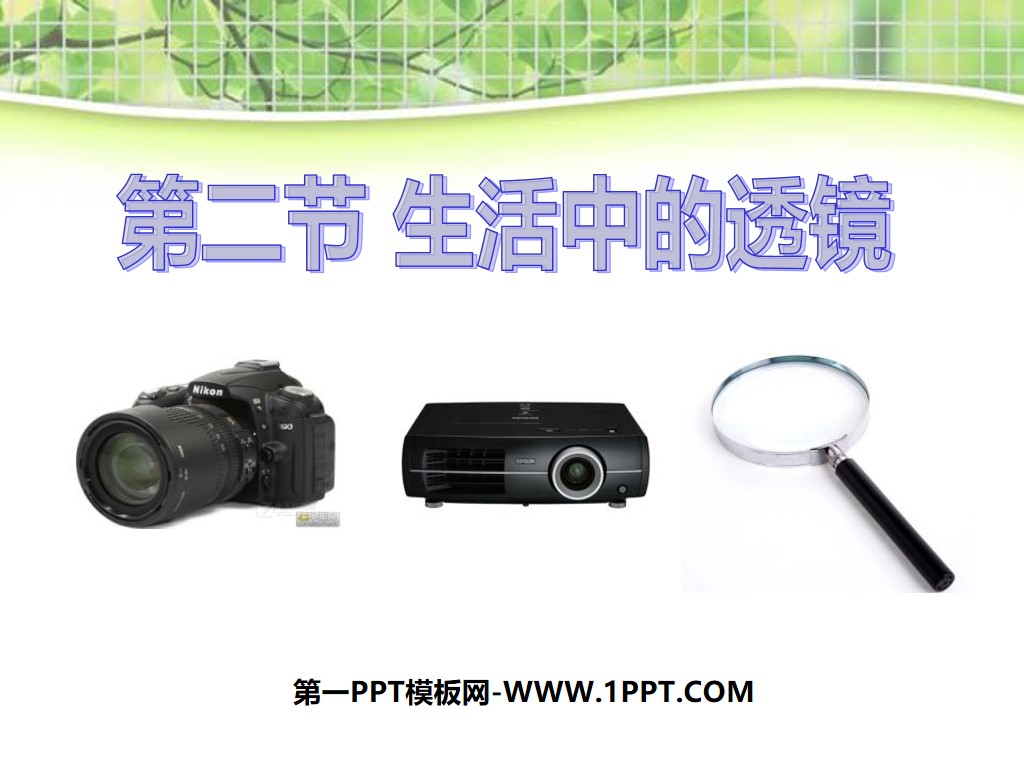
| Category | Format | Size |
|---|---|---|
| People's Education Edition Physics for Grade 8, Volume 1 | pptx | 6 MB |
Description
"Lens in Life" Lens and its Application PPT Courseware 6
1. camera
(1) Main structure
1. Lens: Equivalent to a convex lens.
2. Film: Equivalent to light screen.
3. Adjustment control system.
① Viewfinder: observe the scene being photographed;
②Aperture ring: controls the amount of light entering the lens;
③Focus ring: adjust the distance between the lens and the film, that is, the image distance;
④Shutter: Control exposure time.
(3) Camera imaging characteristics
1. Like to reduce or enlarge? Like standing upright or upside down? Real image or virtual image? The camera produces a reduced, inverted real image.
2. Which is greater between image distance and object distance? The image distance is smaller than the object distance.
3. Are the image and object located on the same side of the convex lens or on different sides? The image and object are on opposite sides of the convex lens
4. How can the image become larger? The distance between the object and the camera becomes smaller and the lens extends forward.
practise
1. The camera lens is equivalent to a _________. The light from the object condenses on the film after passing through the lens, forming a _________ (magnification, reduction) ________ (virtual, real) image.
2. Projector
(1) Main components
(2) Projector imaging principle
Remove the flat mirror (reflector) from the projector and place the slide on the stage. By adjusting the lens, you can get a clear image of the pattern on the projection film on the ceiling. Observe the image upside down.
(3) Projector imaging characteristics
1. Like standing upright or upside down? Like zoom out or zoom in? Real image or virtual image? The projector creates an inverted, enlarged real image.
2. Which is greater between image distance and object distance? The image distance is greater than the object distance.
3. Are the image and object located on the same side of the convex lens or on different sides? The image and object are on opposite sides of the convex lens
4. How can the image become larger? The distance between the object and the projector lens becomes smaller.
3. Magnifying glass
(1) Student group experiment
1. Use a magnifying glass to observe the words in the textbook and talk about what you see?
2. Use a light screen between the object and the lens to see if you can get an image?
3. Stretch out a finger and slowly increase the distance between the magnifying glass and your finger. What do you see?
4. Are the object and image on the same side of the convex lens or on both sides?
(2) Magnifying glass imaging characteristics
1. Like standing upright or upside down? Like zoom out or zoom in? Real image or virtual image? The projector creates an upright, enlarged virtual image.
2. Are the image and object located on the same side of the convex lens or on different sides? The image and object are on the same side of the convex lens
3. How can the image become larger? The distance between the object and the magnifying glass becomes larger.
【In-class training】
1. Which of the following does not belong to the application of lenses in daily life ( )
A. camera b. magnifier
C. Projector D. periscope
2. As shown in the figure, S′ is the image formed by object S passing through a convex lens. So what does this figure represent? ( )
A. camera b. magnifier
C. Slide projector D. projector
3. The camera lens is equivalent to a _________. The light from the object condenses on the film after passing through the lens, forming an _________ (enlarged or reduced) image. When actually shooting, in order to achieve clear images of both distant and near objects, the distance from the camera to the film should be adjusted.
4. In the early morning, the veins under the dewdrops of the grass look larger. This is because the dewdrops act like a mirror, forming a magnified ______ image. This is the result of the ______ reflection phenomenon of light.
summary:
Camera imaging characteristics
Imaging features:
1. Convex lenses are used to form _____ images of _____ and _____.
2. Image distance _____ object distance.
3. The image and object are located on both sides of the convex lens.
4. When the distance between the object and the convex lens becomes _____, and the lens is stretched forward, the _______________ image becomes larger.
Projector imaging characteristics
Imaging features:
1. Convex lenses are used to form _____ images of _____ and _____.
2. Image distance _____ object distance.
3. The image and object are located on both sides of the convex lens.
4. The distance between the object and the projector lens becomes _____, and the image becomes larger.
Magnifying glass features:
1. Use convex lenses to form _____ images of _____ and _____.
2. The image and object are located on the same side of the convex lens.
3. When a magnifying glass is close to an object, it looks like _____.
4. The image seen through a thick magnifying glass is large.
Keywords: Lens and its application teaching courseware, Lens teaching courseware in life, People's Education Edition eighth grade physics PPT courseware download, eighth grade physics slide courseware download, Lens and its application PPT courseware download, Lens in life PPT courseware Download, .PPT format;
For more information about the PPT courseware "Lens and its Applications in Life" PPT courseware, please click on the "Lens and Its Applications in Life" PPT courseware.
"Lens in Life" Lens and its Application PPT Courseware 8:
"Lens in Life" Lenses and Their Applications PPT Courseware 8 Learning Objectives 1. Know the imaging characteristics of cameras, projectors (slide projectors) and magnifying glasses. 2. Understand the main characteristics of real and virtual images of objects. Self-study 1. What are the main parts of a camera? it..
"Lens in Life" Common Optical Instruments PPT Courseware 3:
"Lens in Life" Common Optical Instruments PPT Courseware 3 Self-Study Materials 1. What are the main parts of a camera? What is its lens equivalent? What is the equivalent of film? What are the characteristics of the images of objects on film? 2. What are the main parts of a projector?
"Lens in Life" Common Optical Instruments PPT Courseware 2:
"Lens in Life" Common Optical Instruments PPT Courseware 2 Make some equipment: two paper tubes, convex lenses, and translucent paper. Take a look. Please pick up the camera you made and face it outside the bright window. Pull the paper tube to change the lens and semi-transparent paper. What do you see between the transparent sheets? ..
File Info
Update Time: 2024-07-06
This template belongs to Physics courseware People's Education Edition Physics for Grade 8, Volume 1 industry PPT template
"Lens in Life" Lens and its Application PPT Courseware 6 Simple campus recruitment activity planning plan summary enterprise and institution recruitment publicity lecture PPT template is a general PPT template for business post competition provided by the manuscript PPT, simple campus recruitment activity planning plan summary enterprise and institution recruitment promotion Lecture PPT template, you can edit and modify the text and pictures in the source file by downloading the source file. If you want more exquisite business PPT templates, you can come to grid resource. Doug resource PPT, massive PPT template slide material download, we only make high-quality PPT templates!
Tips: If you open the template and feel that it is not suitable for all your needs, you can search for related content "Lens in Life" Lens and its Application PPT Courseware 6 is enough.
How to use the Windows system template
Directly decompress the file and use it with office or wps
How to use the Mac system template
Directly decompress the file and use it Office or wps can be used
Related reading
For more detailed PPT-related tutorials and font tutorials, you can view: Click to see
How to create a high-quality technological sense PPT? 4 ways to share the bottom of the box
Notice
Do not download in WeChat, Zhihu, QQ, built-in browsers, please use mobile browsers to download! If you are a mobile phone user, please download it on your computer!
1. The manuscript PPT is only for study and reference, please delete it 24 hours after downloading.
2. If the resource involves your legitimate rights and interests, delete it immediately.
3. Contact information: service@daogebangong.com
"Lens in Life" Lens and its Application PPT Courseware 6, due to usage restrictions, it is only for personal study and reference use. For commercial use, please go to the relevant official website for authorization.
(Personal non-commercial use refers to the use of this font to complete the display of personal works, including but not limited to the design of personal papers, resumes, etc.)
Preview





















